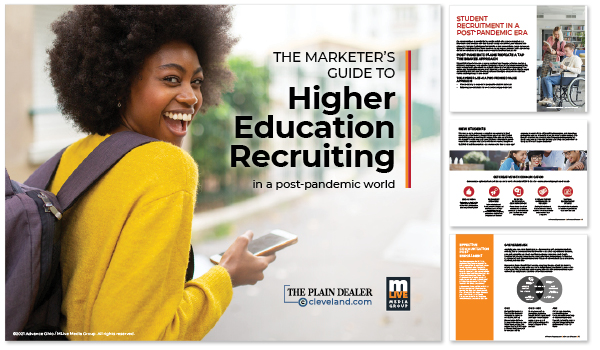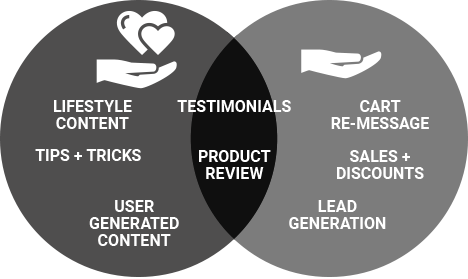When advising institutions of higher learning, we find that there are two key strategy areas that most often ignored. Interestingly, these two areas require similar tactics. Both require a keen eye on interaction between the University and its audience. Both are served by the widely praised and often poorly executed content and engagement strategy. Both serve to strengthen the sentiment of the institutional brand in a person-to-person way.
MOVING FROM AWARENESS TO CONVERSION PHASES
In our firm’s experience, the biggest gap in university strategy exists when the engagement phase of recruitment is skipped. Most institutions value a robust traditional media strategy. Direct mail, Out of Home (Billboards, other outdoor), TV or radio are all broadly utilized traditional media selections, and all of them fit in the Awareness stage of the decision journey. One cannot click to call from a television ad or phone an advisor after seeing a billboard. These tactics are broad awareness efforts. Direct Mail, phone canvassing, high school visits/fairs and high-pressure measures to gain RFI’s or campus visits move immediately to the conversion stage. The Engagement Phase, filled with ‘get to know us’ efforts, is broadly ignored. This blind spot in the decision journey is extremely influential.
IS YOUR TEAM SHARP?
Let Us Help with Regularly Scheduled, Free Virtual Trainings
Gain Actionable Insights for your Marketing Team
Better Understand Strategies used by Agencies to Gain an Edge
Make Better Decisions about Traditional and Digital
Make your Social Media Plan Smarter
Create a Post Enrollment Strategy for Retention
REGISTER FOR ON-DEMAND WEBINAR HERE:

A Free E-Book will be provided to all participants, and there is no obligation to become a client of our firm. These webinars will be hosted by marketing strategists in Michigan and Ohio, but is open to any college, university, or educational institution.
Remaining In Touch Post Enrollment
In this material, we’ll dive more deeply into the second of these concerns, the post-enrollment activity. Also filled with engagement and more personalized interactions, the post-enrollment experience will make the difference between a University among the recruit’s “top three” and where that student will appear on day one. Melt is a painful reality for many recruitment teams, often representing the difference between aspirational models for the future and harsher budget realities.
When we celebrate prematurely, we often ignore the most important stage: ensuring intent of our new recruits.
Effective Communication Post-Enrollment
You have connected with these students. They have committed to taking a step that brings them closer to joining your alumni prospects (on day one of classes). At this stage, forging a personal, lasting connection is more important than ever. Consider these personalization stats: 63% of consumers are highly annoyed with generic advertising blasts, and 80% say they are more likely to do business if it offers personalized experiences. Knowing that to be true for the purchase of a television or service, it’s likely even more so with their choice of alma mater. Because you “know them” now, there’s simply no excuse for not making your interactions as personal as possible.
Give Versus Ask
Inevitably, your enrollment department will be connecting with prospective students with dry, how-to communications that drive their class selections, residential decisions, even parking and dining instructions. These are deeply impersonal, and rife with boredom, but extremely necessary for a successful transition to campus life. These are all examples of “ask” style communications. They are filled with checklists, calls to action, deadlines, and must-do’s.
Give content doesn’t benefit the University in any tangible way. Instead, it’s meant to entertain, educate, or inspire the recipient. It makes the audience better, happier, or feel closer to you. This content must equal or outnumber the “ask” communications, or your relationship already feels transactional rather than emotional.

GIVE
Content that gives only benefits the consumer. It’s meant to entertain or educate, making the consumer better or happier, while steering your brand narrative. Use your organic feed to GIVE to your audience. Boost your post to increase visibility.
ASK
If it has a call-to-action, you are asking your consumer to do something in response to your post. Your ask content belongs in ads, and is targeted to your audience and those like them.
GIVE + ASK
Drive revenue while providing a consumer benefit with this combined post type. It could appear organically or in paid media, depending on the tone and appeal of the content.
GIVE
Content that gives only benefits the consumer. It’s meant to entertain or educate, making the consumer better or happier, while steering your brand narrative. Use your organic feed to GIVE to your audience. Boost your post to increase visibility.
ASK
If it has a call-to-action, you are asking your consumer to do something in response to your post. Your ask content belongs in ads, and is targeted to your audience and those like them.
GIVE + ASK
Drive revenue while providing a consumer benefit with this combined post type. It could appear organically or in paid media, depending on the tone and appeal of the content.
Sample Content for Post-Enrollment Communications

Take Action to Avoid Depressed Yield
The post-enrollment experience will make the difference between a University among a recruit’s “top three” and where that student will appear on day one. It’s within your power to influence this decision with more “give” than “ask.” Do this better than your competitors, and you’ve made the critical difference.
Other content you may find helpful is linked below. Your students aren’t a “sure thing” at this stage. Remember that you are still wooing them! Consider how your strategy for connecting with these enrollees and what will make them feel even closer to your brand. (Gifts are never a bad idea, either.)






 Ad Choices
Ad Choices
